MercoPress. South Atlantic News Agency
Tag: human rights
-
Wednesday, August 7th 2013 - 17:42 UTC
AI top level mission to Brazil to discuss indigenous peoples’ rights and police violence
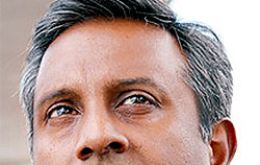
Indigenous peoples’ rights and police violence are the focus of a High Level Mission (HLM) by Amnesty International’s Secretary General, Salil Shetty in Brazil where he is scheduled to meet with top politicians and officials to discuss an array of human rights abuses and violations which need to be addressed.
-
Wednesday, July 24th 2013 - 07:09 UTC
Cristina Fernandez candidate for Army Chief questioned over human rights record
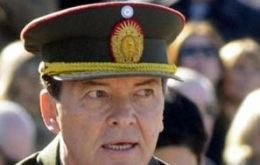
Argentine President Cristina Fernandez has defended the designation of César Milani as head of the Armed Forces, and complained that “those who previously voted for the Due Obedience and Final Stop laws put in doubt” her administration's “human rights record”.
-
Friday, May 24th 2013 - 06:55 UTC
Former Ford executives charged in Argentina for human rights crimes

Three former Ford Motor Co. executives have been charged with crimes against humanity in Argentina for allegedly targeting union workers for kidnapping and torture after the country's 1976 military coup.
-
Tuesday, May 21st 2013 - 06:34 UTC
Falklands: optimism about identification of the unknown Argentine soldiers
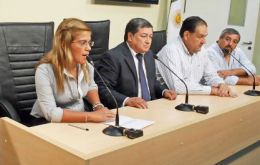
An Argentine delegation involved in human rights that in early May visited the Falkland Islands is optimistic about the possibility of advancing in the identification of the remains of Argentine soldiers buried as unknown in unmarked graves at the Darwin cemetery.
-
Thursday, May 16th 2013 - 19:39 UTC
Falklands’ lawmakers meet Chaco human rights group following formal Argentine request
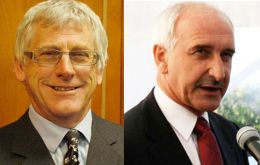
On request from a group of human rights representatives from Chaco, Argentina, Falkland Islands lawmakers met and listened to their views on a number of issues resulting from the 1982 war. The meeting followed a formal request from the group directly to the Falklands elected Legislative Assembly.
-
Monday, February 25th 2013 - 06:50 UTC
Demonstration against Uruguay Supreme Court to protest human rights rulings
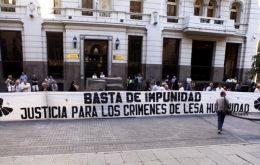
Human rights groups with the support from political organizations, labour unions and students are planning a march and demonstration against Uruguay’s Supreme Court to protest a ruling that in effect re-instates an amnesty law which benefits military and police officers allegedly involved in human rights crimes during the 1973/84 dictatorship.
-
Sunday, October 21st 2012 - 06:11 UTC
Argentina evacuates impounded frigate; Monday Timerman begins lobbying at the UN
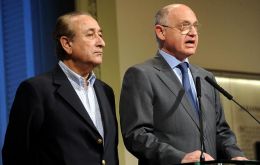
The Argentine government ordered on Saturday the evacuation of the naval training frigate ARA Libertad impounded in Ghana by international creditors, following the warning made on Friday that complaints would be taken to the UN over the controversy.
-
Friday, October 19th 2012 - 00:48 UTC
Argentine military governor of the Falklands arrested for human rights violations
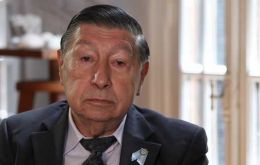
The military governor of the Falkland Islands during Argentina’s brief occupation of the archipelago in 1982 was detained for his alleged role in human rights abuses at a notorious torture center in the 1970s, prosecutors said Thursday.
-
Tuesday, July 24th 2012 - 21:36 UTC
Argentine military dictator confirms Catholic Church hierarchy was well aware of the “disappeared”
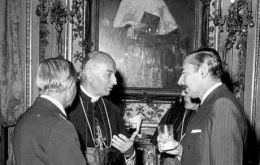
Argentine former military dictator said he kept the country’s Catholic hierarchy informed about his regime’s policy of “disappearing” political opponents, and that Catholic leaders offered advice on how to “manage” the policy.
-
Saturday, March 17th 2012 - 07:18 UTC
Brazilian judge dismisses first dictatorship era case involving an Army officer
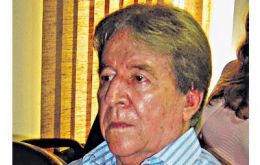
Brazilian judge dismissed the first charges ever brought against an army officer over crimes committed during the country's 1964-1985 military dictatorship, dealing a blow to rights groups and victims' families.
